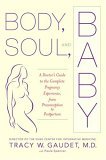Body, Soul, & Baby

As often happens with women, I was optimally dedicated to self-care when I was pregnant. I fueled my body with good food, swam laps several times a week up until the day before Laurel was born (the lifeguards always looked terrified when they saw me waddling up to the lanes), and calmed my mind with plenty of stretching and breathing.
Even so, it wasn’t until the last few years – during which I faced the major life stressors of becoming a parent, losing loved ones, and experiencing the mother of all professional upheavals – where I really started thinking about mind-body connection practices, largely thanks to the therapist Jon and I started seeing after Laurel was born, and from what I have learned via Jon’s dedication to mindfulness practices.
Related to pregnancy and mindfulness, I recently was fascinated to learn about Tracy Gaudet’s Body, Soul, & Baby via my work with the Parent Bloggers Network. Dr. Gaudet heads up integrative medicine at Duke Medical and her book offers a thorough reference in which she weaves together complementary and conventional Western medical practices to present an integrative guide to pregnancy from preconception to postpartum. The essential pregnancy and postpartum stages, procedures, and facts are covered, and integrative applications come alive with case studies from the clinic; these stories are particularly effective in illustrating the mind, body, and soul “tuning in” techniques that Gaudet outlines in the book’s opening chapters.
As Jon and I think about having a second child, I couldn’t help but gravitate towards the section on preconception. And I found Gaudet’s ideas about the importance of becoming an “active participant” in pregnancy particularly compelling. As a former academic, where pregnancy often is considered the professional kiss of death (the publish or perish clock continues to tick even if you’re on maternity leave), or even generally, knowing plenty of women with their own physical, professional, or logistical ticking clocks, pregnancy often is motivated by pragmatics, if it’s not accidental. Gaudet manages to comment on the prevalence of these scenarios without sounding judgmental, and then proceeds to make a convincing case for setting an intention around pregnancy and having it be a “conscious conception.” Setting an intention is very different from the typical “we’re trying” language of preconception that has always troubled me (personally, it conveys an achievement-based approach to conception with implied perception of failure if things don’t work out). In contrast, Gaudet’s idea of setting an intention around being pregnant really spoke to me; that through evaluation of your mental, spiritual, and physical readiness (she provides the tools to do this) you become an engaged, fulfilled part of the process and are able to then welcome or invite the possibility of pregnancy into your life. It may seem like semantics, but the shift in mindset and language matters.
I should say that one thing that’s been made clear through my own therapeutic work is that shifting your mindset after some 30 odd years of stubborn habits requires a lot of work (and I fully admit to struggling to achieve balance and mindfulness in the crazy every day that is modern parenthood and work), but the rewards are innumerable. If you’re unfamiliar with mindfulness-based techniques, Gaudet’s approach may initially seem intimidating. But I highly recommend hanging with it and opening your mind to the concept; Gaudet is clear in her description of how to implement awareness practices in relation to mind, nutrition, movement, relationships, sensuality and sexuality, and feelings about childbearing and childrearing in a way that encourages you to be honest and blissfully free of the typical lurking inner critic. These practices will not only nurture your mind, body, and spirit through pregnancy, but they will serve you well on a day-to-day basis through life.
